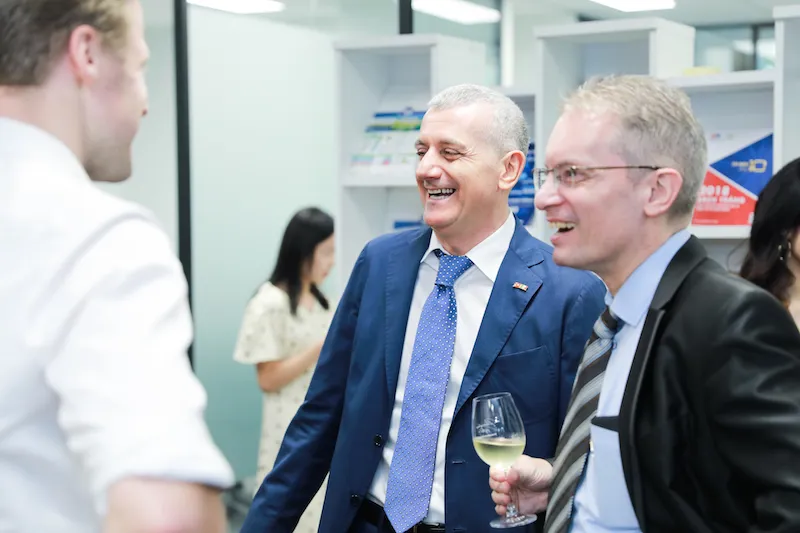Vietnam among most dynamic investment destinations for European businesses
A worsening global economic environment is taking its toll on the optimism amongst European business leaders in Vietnam.
Vietnam will certainly be in a better position in two or three years, demonstrating its place among the most exciting and dynamic business and investment destinations.
| CEOs of European businesses gather an event in Ho Chi Minh City last April. Photo: EuroCham |
Chairman of the European Chamber of Commerce in Vietnam (EuroCham) Alain Cany gave his prediction in the latest report of the Business Climate Index (BCI) conducted by the EuroCham and YouGov Decision Lab. “The future of Vietnam is bright,” he said.
He added Vietnam offers great investment opportunities for European businesses in the short-medium term. Through the EU-Vietnam Free Trade Agreement and shared commitment to sustainable development, Vietnamese and European companies have a great deal of growth potential.
The third-quarter (Q3) report showed European respondents expect Q4’s investment planning, orders, and revenues to remain relatively stable compared with the previous quarter.
“The outlook appears to be more optimistic than that for the economy as a whole,” it noted.
Although Vietnam’s economy grew at a record 13.67% year-on-year in Q3 2022, the BCI declined for the second consecutive quarter, dropping 6.4 points from Q2 and 10.8 points from Q1. The index dropped from 68.8 points in Q2 to 62.2 in Q3 in the wake of a worsening global economic downturn.
This came at a time when global economic conditions remain unstable due to the escalating conflict in Ukraine, persistent inflationary pressures, a labor shortage worldwide, and stagnant global growth.
Amid the current global economic uncertainty, the BCI was still 10.2 points higher than its pre-pandemic level of 52.0 in Q4 2019, and 1.2 points higher than Q4 2020, when Vietnam was easing its pandemic-related restrictions.
The BCI’s results also showed a decline in optimism among European business stakeholders.
Approximately 42% of participants anticipate that the economy will stabilize or improve in Q4 2022. This is an 18-point decrease from the previous quarter, when 60% maintain this view. Similarly, the percentage of those anticipating economic deterioration increased by seven points to 19%.
Prospects for Vietnam's foreign direct investment
Regarding foreign direct investment (FDI), 42% anticipate that their firm will increase FDI flows to Vietnam by the end of 2022.
The respondents indicated that Vietnam could bolster these FDI levels by reducing administrative difficulties (68%), improving infrastructure (53%), developing human resource capacity (39%), and reducing visa barriers for foreign experts (39%).
While only 2% of BCI participants said they have relocated a significant portion of their operations from China to Vietnam, this suggests that there is still considerable room for growth. If these aforementioned obstacles are resolved, Vietnam would be well positioned to attract more foreign firms relocating from China.
Despite a quarter of respondents identifying green growth as a key factor in attracting FDI to Vietnam, the number of respondents who rated Vietnam's green potential positively decreased from 44 to 32%.
To accelerate green development, participants in the BCI said Vietnam should improve its legal framework (92%), its infrastructure (87%), and its investment incentives (86%).
As August 2022 marked the two-year anniversary of the implementation of the EU-Vietnam Free Trade Agreement (EVFTA), the perception of its benefits has declined by four percentage points in comparison to the previous quarter.
Administrative procedures were cited as the primary reason for this (38%), followed by a lack of understanding of the agreement (18%), and technical barriers to trade (16%).
Cany underlined: “It is true that we are less optimistic now than we were at the beginning of 2022 due to external factors slowing global growth. The fourth quarter will also likely be less positive than the second or third quarters of the year.”
CEO of Decision Lab Thue Quist Thomasen added by curbing inflation, improving credit ratings and continuing GDP growth, Vietnam’s story stands out as less pessimistic globally as companies plan and look forward to 2023.
By dropping 6.4 index points to 62.20, sentiment remains well above the midpoint of 50, indicating positive sentiment and a still optimistic view on the future, he said.












